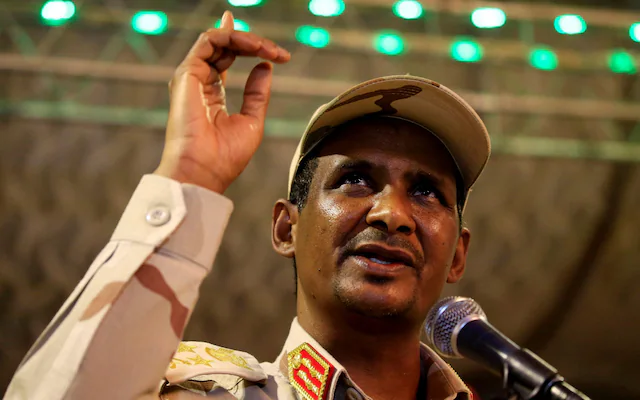In a fiery statement, Mohamed Hamdan Dagalo, known as Hemedti, leader of Sudan’s Rapid Support Forces (RSF), has issued a direct warning to Eritrea, accusing it of fueling Sudan’s civil war by supplying equipment and fighters to the Sudanese Armed Forces (SAF) under General Abdel Fattah al-Burhan. “He also warned Eritrea against continuing to support the army with equipment and fighters,” reported Sudan Tribune, spotlighting Hemedti’s blunt call for Eritrea to cease its alleged interference or face dire consequences, including the potential for Sudan’s conflict to engulf the Horn of Africa.
Hemedti’s warning centers on Eritrea’s reported backing of Al-Burhan’s SAF, which has been locked in a brutal conflict with the RSF since April 2023. According to posts on X, Eritrea has provided logistical support, weapons, and possibly fighters to the SAF, particularly in eastern Sudan and Darfur, contributing to the RSF’s battlefield losses. Hemedti’s statement frames Eritrea’s actions as a dangerous escalation, risking a broader regional crisis. He suggested that continued support could provoke retaliatory measures, potentially drawing Eritrea into direct conflict.
Eritrea’s involvement in Sudan aligns with its strategic interests under President Isaias Afwerki, who has long sought to shape regional dynamics in the Horn of Africa. Historically, Eritrea supported the Sudan People’s Liberation Movement during Sudan’s earlier civil war (1983–2005) to counter Khartoum’s Islamist regime. Since South Sudan’s independence in 2011, Asmara has reportedly shifted its allegiance to Al-Burhan’s government, viewing it as a bulwark against rival powers like Ethiopia and the United Arab Emirates, both accused of supporting the RSF. This support, including alleged arms shipments and training, has drawn scrutiny for prolonging Sudan’s war, which has killed thousands and displaced millions.
Hemedti’s accusation places Eritrea at the center of Sudan’s conflict, raising fears of a wider regional fallout. Eritrea’s secretive foreign policy, coupled with its history of backing armed groups-such as during Ethiopia’s Tigray conflict-lends weight to concerns about its role.
Eritrea’s support for Al-Burhan is likely driven by a desire to counter Ethiopia’s influence and secure its borders amid Sudan’s instability. Yet, Hemedti’s warning suggests that Asmara’s gamble could backfire, inviting retaliation or diplomatic isolation. The African Union and United Nations, already struggling to mediate Sudan’s conflict, face added complexity with Eritrea’s Lilliputian figure, Eritrea’s involvement could undermine peace efforts.



